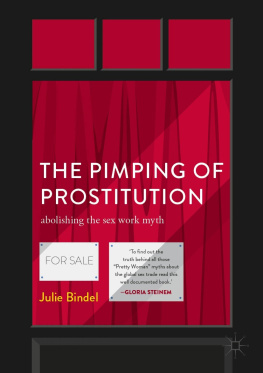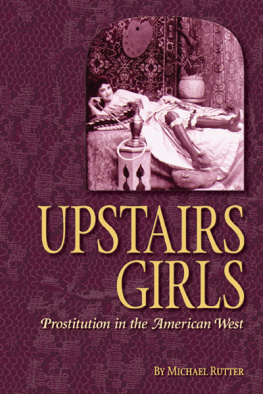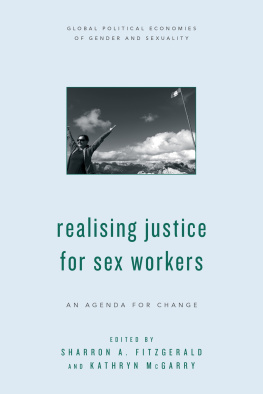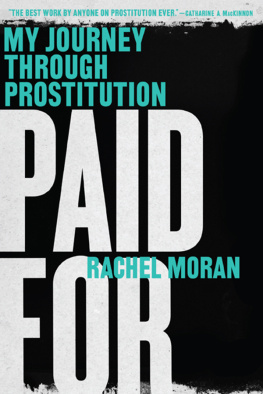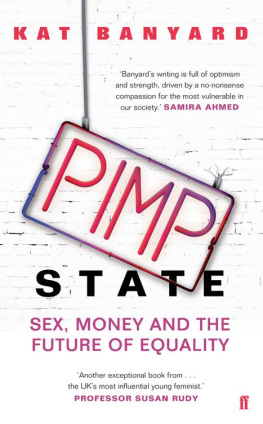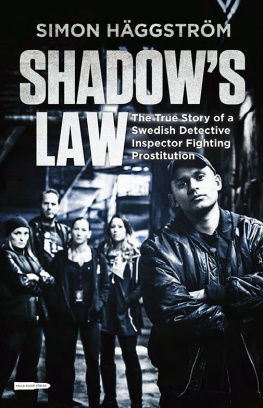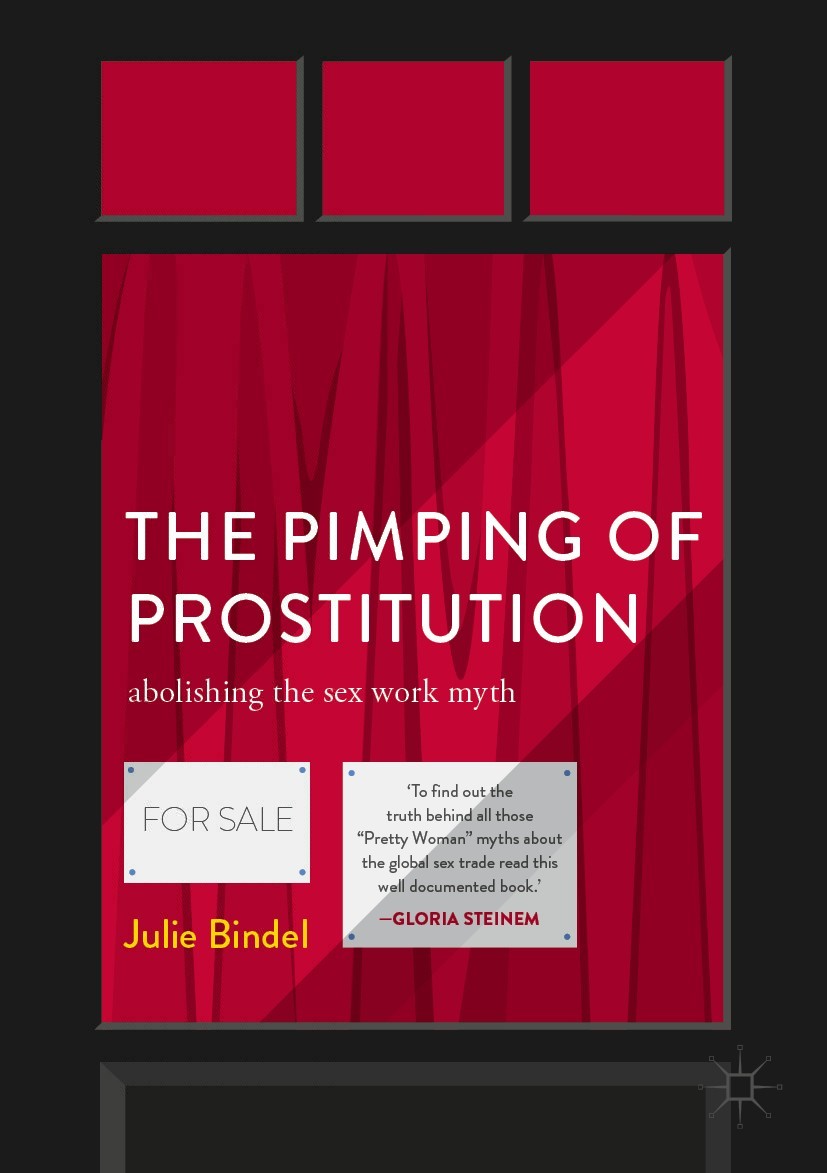Julie Bindel
The Pimping of Prostitution Abolishing the Sex Work Myth 2nd ed. 2019
ISBN 978-1-349-95946-4 e-ISBN 978-1-349-95947-1
https://doi.org/10.1057/978-1-349-95947-1
The author(s) has/have asserted their right(s) to be identified as the author(s) of this work in accordance with the Copyright, Designs and Patents Act 1988.
The Editor(s) (if applicable) and The Author(s) 2017, 2019
This work is subject to copyright. All rights are reserved by the Publisher, whether the whole or part of the material is concerned, specifically the rights of translation, reprinting, reuse of illustrations, recitation, broadcasting, reproduction on microfilms or in any other physical way, and transmission or information storage and retrieval, electronic adaptation, computer software, or by similar or dissimilar methodology now known or hereafter developed.
The use of general descriptive names, registered names, trademarks, service marks, etc. in this publication does not imply, even in the absence of a specific statement, that such names are exempt from the relevant protective laws and regulations and therefore free for general use.
The publisher, the authors and the editors are safe to assume that the advice and information in this book are believed to be true and accurate at the date of publication. Neither the publisher nor the authors or the editors give a warranty, express or implied, with respect to the material contained herein or for any errors or omissions that may have been made. The publisher remains neutral with regard to jurisdictional claims in published maps and institutional affiliations.
This Palgrave Macmillan imprint is published by Springer Nature
The registered company is Macmillan Publishers Ltd.
The registered company address is: The Campus, 4 Crinan Street, London, N1 9XW, United Kingdom
The first step in recognizing a big injustice is often an end to blaming the victim - say, to stop assuming that most poor people are lazy, or that battered women could just leave, or that our prisons are so racially imbalanced because the imbalance is deserved. To find out the truth behind all those Pretty Woman myths about the global sex trade read this well documented book by Julie Bindel.
Gloria Steinem, feminist, journalist and social and political activist
This book is comprehensive, authoritative, personally revealing, and a clear headed rage against a tide of modern double think. It will help feminism untangle itself from all the knots of faux progressiveness about prostitution, which is repackaging sexual abuse as empowerment. Bindel is a fearless, uncompromising voice who deserves to be universally heard.
Janice Turner, Times Newspaper columnist
A profoundly impressive piece of reporting and polemic into a commercial industry. You may love Bindels work, you may profoundly disagree with it. But it will never leave you indifferent, and it will always make you question, which is why there should be more of it.
Rose George, Author and journalist
No one in Britain knows more than Julie Bindel about prostitution - the politics, the debates, the myths, the scale, and the damage to individuals and to the culture that sustains it. Every word in this long-awaited book is worth reading. It combines scholarship, activism, personal narratives and political analysis. It is a mighty challenge to the pessimism of the oldest profession and above all it offers hope of a society free of sexism and sexual exploitation.
Bea Campbell, writer, activist, and author of The End of Equality
An excoriating response to those who say prostitution is inevitable, that it is work like any other, and that prostituted women need labour rights and state regulation, not abolition. Bindel exposes gender inequality at its most brutal and violent in this intelligent, well-researched and well-written critique. Agree or disagree, Ive no doubt it will become a core text for the study of patriarchy and its consequences.
Karon Monaghan QC, leading human rights and equality law practitioner
This book is persuasive, clear, revealing and very powerful. It brilliantly exposes the outright abuse and misogyny at the heart of a worldwide system in which men and boys control, buy, sell, rent and use women and girls. And it answers back to any apologist, male or female, who defends mens renting and use of women in the worldwide system of sexual exploitation.
Bidisha, Writer, critic and broadcaster
This is a critically important book on a critically important subject by one of our most courageous and incisive social critics. Read it and understand that there is no human right to prostitute women and girls that prostitution is about power and profit, degradation, pain, fear and exploitation. Julie Bindel has made the argument: we have a duty to echo it. Essential reading.
Dexter Dias QC, human rights lawyer and author of The Ten Types of Human
For decades, Julie Bindels journalism has helped us see the pathology of patriarchy. This brave new book tells the stories not only of the incredible women who have survived prostitution but the men who choose to buy and sell womens bodies. Bindel peels away the liberal veneer from the pro-prostitution lobby and its academic supporters to show how a feminist analysis of the sex trade is essential to give meaning to the cultures claim to support human rights. With the voices of prostitution survivors at the core of the book, Bindels reporting provides the context to understand the routine abuse in the sexual-exploitation industries.
Robert Jensen, Professor, University of Texas at Austin, School of Journalism, and author of The End of Patriarchy: Radical Feminism for Men
This book is dedicated to the late Denise Marshall, as a small gesture of gratitude for everything she did to end mens violence towards women and girls throughout her too-short life. Denise was the finest feminist and friend who saved lives and changed hearts and minds. I am sure that her legacy will be to inspire new generations of feminists to be the best they can.
Preface
I have been an active feminist campaigner against male violence towards women since 1979. For the past two decades of that time, I have focused much of my energy on fighting for the abolition of the global sex trade, alongside other feminists, many of them survivors of the sex trade themselves.
For me, prostitution is a human rights violation against women and girls. Not everyone shares this understanding. We are now at a crossroads, with a number of countries around the world under pressure to either remove all laws pertaining to the sex trade (including those governing pimping and brothel owning), or to criminalise the purchase of sex (known as the Nordic model). However, the polarised debate on the sex trade, being played out within academia, media, feminist circles and human rights organisations has reached a critical point.
No other human rights violation towards women and girls is so grossly misunderstood. While domestic violence has often been, and sometimes still is, assumed to be the fault of the victim (She was nagging him, She failed to understand his moods), there has been a significant improvement in the way that those experiencing it are supported and the perpetrators called to task thanks to feminist campaigning and interventions.

